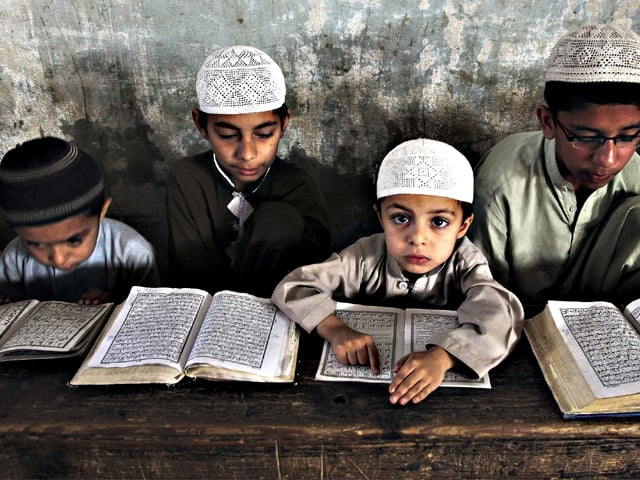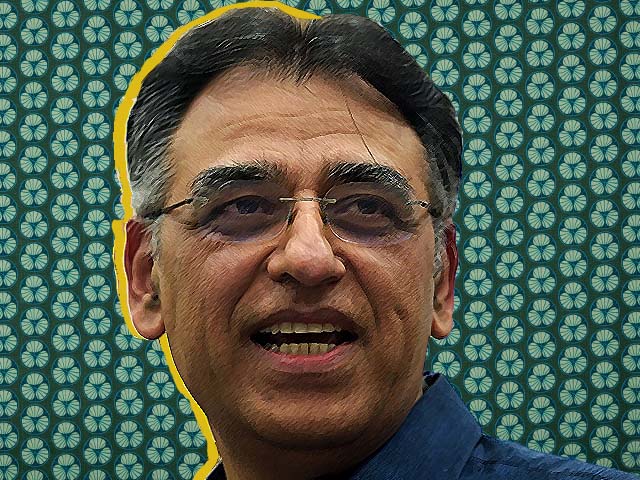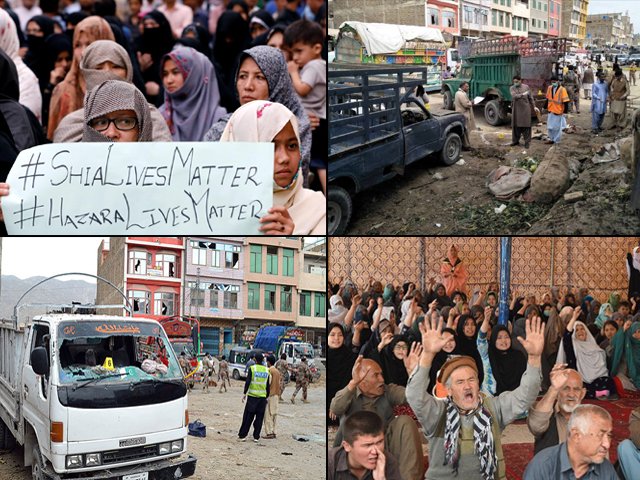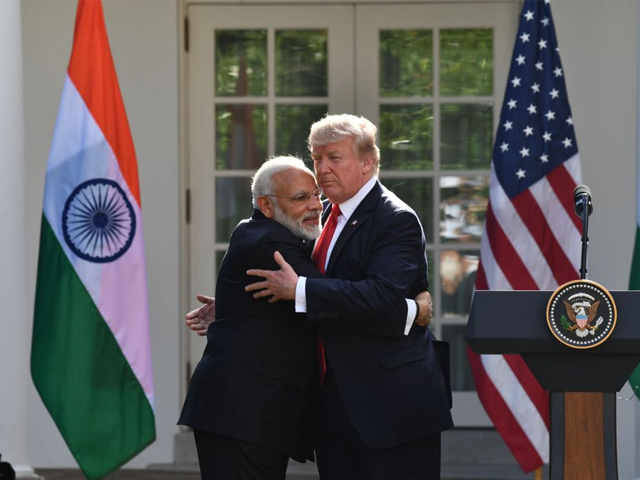
Students at a madrassa in Karachi on March 4, 2015. Religious schools in Pakistan are sometimes the only source of education for children. PHOTO: AP
I support the Compulsory Education of Arabic Bill 2015
Data showed that of the captured recruits 42% were from K-P, followed by almost 40% from Punjab and 14.1% from Sindh.
Recently, a friend asked me if I had seen the movie ‘Fifty Shades of Grey’. Being averse to things I have no real interest in, I told him I see it every day. Surprised, he asked me what I meant, to which I replied,
“In Pakistan, we are all to some level masochistic. Either that or we are just plain servile. How can we be bombed, killed, raped and beaten into submission every day and just go on with our lives as if nothing is happening?”
Pakistan has a history of insurgency and violence, which reached its peak during the ‘War on Terror’ years. Any smarter nation would not only have reacted to this violent upsurge as the Pakistan Army did, but also attacked the root causes of the violence. That is where the real battle lies. How can we stop the factories that produce these terrorists? Any talk of restructuring the madrassa system or revamping their curriculum is met with fierce resistance primarily from religious groups and then from the ‘secular’ political parties as well. The debate automatically deteriorates into an emotional moral relativist realm, massively complicated by Pakistan’s blasphemy laws. Any attempt at correcting anyone’s erroneous beliefs is vetoed by the cries of ‘blasphemy’ from the defending party.
These grey areas in our political structure have led to mass murder and rape becoming acceptable.
Our political leaders unfortunately fit the Quranic description of ‘deaf, dumb and blind’ (Surah Baqarah 2: 18). Having leaders who are more afraid of terrorists than the thought of being answerable to God for their actions, don’t warrant any more censure. I am actually starting to feel tired of criticising our current political appointees, frankly because they don’t really give a damn about the populace they claim to represent.
Our interior minister, Chaudhry Nisar, had refused to arrest Lal Masjid’s Abdul Aziz aka Mullah Burqa (a name he acquired when he tried to run from the siege of Lal Masjid in a burqa), claiming that it would have serious repercussions on the law and order situation in the country. All this went to hell when the current spates of violence were committed by the Tehreek-e-Taliban Pakistan (TTP) as part of ‘Operation Ghazi’. Abdul Rasheed ‘Ghazi’ after whom TTP have named their terrorist upsurge, was Mullah Burqa’s brother who was killed by Pakistan’s SSG during the siege of Lal Masjid.
For our interior minister, capturing and killing a known terrorist facilitator is more problematic as opposed to dealing with the hundreds of innocents deaths that have occurred during the last two weeks all across Pakistan. I was thinking of writing a few expletives as a follow-up sentence but I am sure The Express Tribune editors will censor them, so I’ll just let the readers think up a few of their own. Our politicians enacted the National Action Plan (NAP) only to throw it away in the parliamentary archives similar to all other useful pieces of legislation.
Recently, another piece of legislation is up for debate, which might have a positive impact on our ability to tackle pseudo-religious terrorism. The Compulsory Education of Arabic Bill 2015 is currently on the discussion table in the National Assembly. Similar to other such useful bills, the debate is on-going without any real end in sight. Is teaching Arabic really a good option?
I, for one, am a supporter of this bill provided the language to be taught is classical Arabic, which is compulsory for the understanding of the Holy Quran rather than the modern language. There are some pertinent facts that should be known to all why the teaching of classical Arabic is not only important, rather it would be criminal not to approve this bill.
A study conducted by psychologist Dr Sohail Abbas post-9/11 – also published as a book titled ‘Probing the Jihadi Mindset’ (National Book Foundation, 2007) – gave a great insight into jihadi ideology and recruitment. He studied 517 militants captured at the border between Pakistan and Afghanistan ranging between the ages of 17 and 72 years. These men had gone to Afghanistan to fight against the Americans. His study showed that unlike the stereotypical myth that most people have regarding the insurgency’s motivation, recruitment and more importantly participation, the jihadis are not entirely poor, illiterate, rural youngsters from the Federally Administered Tribal Areas (FATA). Demographical data accumulated by his study showed that 42% of the captured recruits were from the Khyber- Pakhtunkhwa (K-P), closely followed by almost 40% from Punjab and 14.1% from Sindh.
Seventy four per cent of the captured fighters were below the age of 30, clearly making it the largest age bracket, and around 68% of them belonged to rural areas. These fighters were mostly young but most of them had received some sort of education or another as only 44.3% were illiterate. Despite the obvious perception that these fighters are hardened Islamists, only 29% of them had attended a madrassa and surprisingly a whopping 72.5% of them had attended it for only six months or less. Another surprising figure is that only 52.5% of the militants had received any sort of religious education at home or abroad, further debunking the Islamist myth.
Dr Abbas’s data proves that almost all of Pakistan is prone to recruitment by extremists, who target youngsters in particular belonging to rural Pakistan. Another element that stands out is that people with little religious knowledge are highly susceptible to fall for convoluted religious propaganda. The largest number of people joining such militant causes are the ones convinced by a mullah from their frequented mosque.
If we can teach our children English to further their careers and economic standing, I am sure we could teach them Arabic to at least make them capable enough to withstand convoluted ideologies. With the jihadis moving into the online realm, saving our children is becoming increasingly difficult. The war for hearts and minds is being fought in our homes, on television, computers, tablets and cell phones. If you are a caring parent, please don’t wait for this lame duck government to enforce Arabic as a language – please hire a tutor who can teach your children the beautiful language. We can’t be everywhere to protect our children from these hatemongers. Let us at least give them a fighting chance to survive what’s coming for them in the age of cyber terrorism.




COMMENTS (28)
Comments are moderated and generally will be posted if they are on-topic and not abusive.
For more information, please see our Comments FAQ